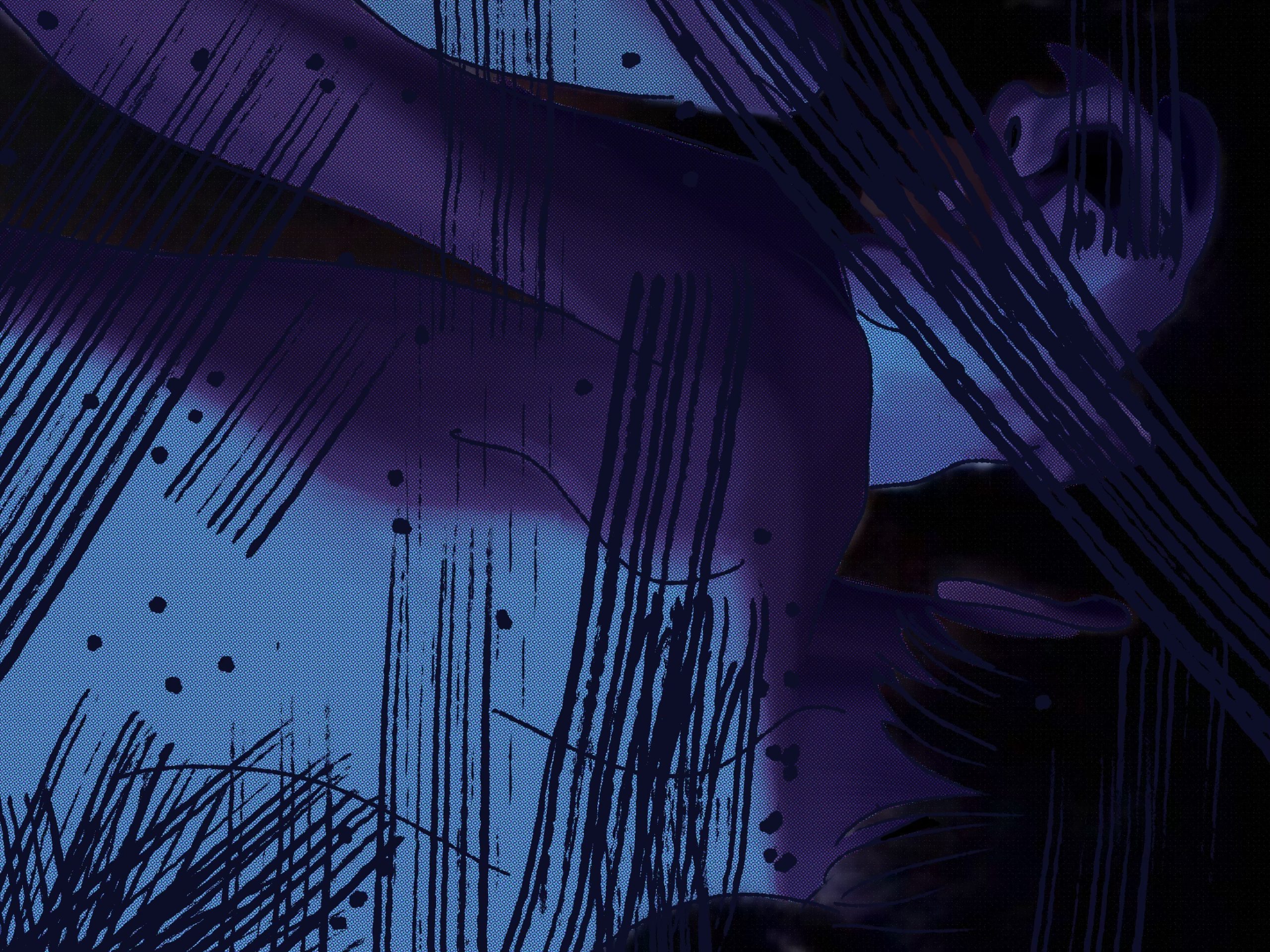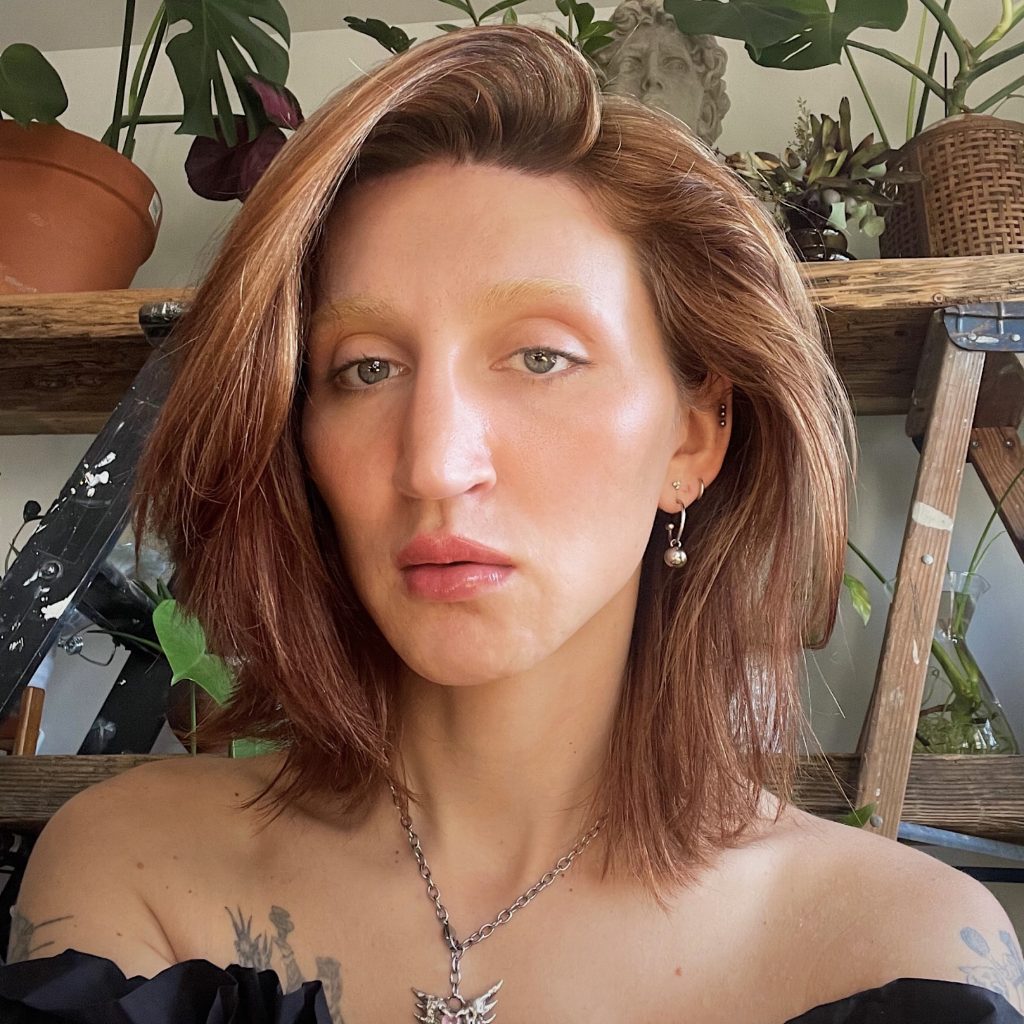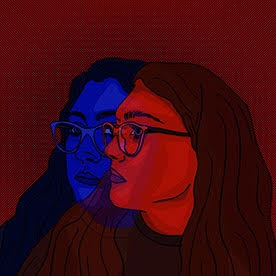A Miserable Party
riley yaxley pens an elegant, elegiac, and heartbreaking ode to the dissolution of a relationship, the perils of love, trans womanhood, and the grace that is found through writing the self.

I am going to hate holidays again. And eating dinner. And reading books that include a protagonist experiencing any type of passion.
Nomi warns me against dating another writer because they are always trying to control the narrative. No one should date a writer, the evidence is on this page. Saffron begs me to date women. Clit does, too, in a gentler manner. My family will pity me again. My fate was determined when I decided to become a woman. A lifetime of being tapped by faceless profiles on Grindr.
My voice breaks while I’m on the phone with my mom. She hasn’t gone through a breakup since she was a teenager. And I’m trans. So we end up in an emotional standstill. “Umm, he wasn’t very nice to me,” I explain. Succinct. I want to ask her if she has a similar experience of womanhood, of relationships with men, of feeling underappreciated and depleted. But I don’t. I falter. I am embarrassed to imply we share femininity. She is quiet. “You deserve better”, she says. “Thanks”. We are both quiet. I say goodbye.
Liv and I take shots of tequila. Over a pepperoni pizza. My mood doesn’t change. My body was already numb. From dehydration. I drank a glass of water between each bout of tears. Or tried to. But three hours of histrionics left me weak and moody. I am like a stupid earthworm crawling to its own death. Waiting to dry out on the concrete. Or for someone to step and flatten me. Into a thin, irregular stain. Maybe I am delusional. To borrow his words. I made a choice antithetical to a happy, normal life. I wonder if I am heartless. I am always breaking things off. Or thinking about breaking things off in a relationship. Is it a neurosis to repeat these insecurities? Do things always come to an end?
Somehow this new misery feels better than being hungover on the airplane. There is no free Wi-Fi, and I refuse to pay $15 to scroll through Twitter with my brightness turned down in case porn crosses my feed. Excruciating because I want to see the porn. Even performative images of physical intimacy would be a comfort. I try reading Kay Gabriel’s Kissing Other People Or the House of Fame. The second half of the book is a series of dreams. But the idea of dreaming makes my stomach drop. I know he will appear in my unconscious. And also I loathe the idea of thinking about being trans right now. God, I wish I had Tylenol. I should never fly American again. I drank too much coffee. I have to pee and feel myself on the verge of tears, but I’m stuck in this window seat and would have to ask my two seatmates to stand up so I can use the bathroom. I would rather piss myself than hear my voice aloud right now.
I woke up from my nap. My chest felt constricted. The same sensation I experienced right before both my surgeries when I was wearing that mint green bouffant cap and dreading the unknown effects of change. My transformation is in the hands of someone who is quiet, withholding, and loathes being asked questions. I may become unrecognizable afterwards.
He was in my dream. Knew it. His hair is feathery and beautiful from biking in the wind. I feel betrayed because this is how it all started. Him appearing in my unconscious, on the rare occasions he wasn’t in the bed beside me, giving me an excuse to text him, “u were in my dream last night.” Vomit. I hear how it sounds. So sentimental. He wouldn’t understand. He views the world as black and white, follows some universal logic. I am more capacious. I accept that myself and others are driven by mysteries, chaos, surprises; nothing is linear. It is impossible to understand why we are together. We insult each other. We’re unkind. We make each other feel insecure. Will it always be like this?
I call him. Because I want to see him. We are always fine when we first see each other. He will smile. I will smile. Both of us feel delight, like seeing a familiar, beautiful landscape after a long period of separation. We’re electrified from nostalgia but the view will become commonplace again. We are always fine when he can nuzzle his head against me, when I am warm and maternal. Before he wants his independence. I ask a leading question. Then another, then another, until I lose control of the conversation. I ask him for affirmation. Though I understand it’s possible my feelings of insecurity aren’t related to my situation with him. They might be the ghosts of past lovers. His expression doesn’t change. There is something inside him I cannot reach. Is it just emptiness? I cover my face, ashamed to be overtaken by my emotions. I’m not even sure what we’re arguing about anymore. Our disagreements take a predictable shape, like a food chain. Our trivial miscommunications are devoured by unmanaged insecurities, which are swallowed by absolute resentment. There is only one possible outcome: separation.
Something is left unsaid. But I can’t put my finger on it. I can’t feel my fingers. Maybe I’m just drunk. Or sad. Or both. I tell everyone I am doing everything possible for us to reach a mutual decision. But that’s not true. I’m writing instead.
Elena Ferrante writes about a woman experiencing the loss of a relationship in her 2002 novel The Days of Abandonment. Mario tells Olga he is leaving her and their two children after 15 years of marriage. Olga found Mario impossible; he never said what he felt, what he wanted, or what she should expect for herself. During their final conversation, she oscillates between empathy and desperation:
“I listened to him attentively, I contradicted him calmly, I didn’t ask him questions of any kind nor did I dictate ultimatums, I tried only to convince him that he could always count on me. But I have to admit that, behind that appearance, a wave of anguish and rage was growing that frightened me.”
He leaves regardless. He already decided everything. There will be no explanation. Olga feels that Mario has taken everything except her, her body, her charming personality. Ditto.
My nail technician tells me she isn’t dating because too many people date to avoid loneliness rather than for genuine connection. I feel guilty. I am late for our dinner. He is waiting outside in his car. I bring him the salted chocolate chip cookie she offers me. He takes me to the restaurant where Manu works. I don’t tell him. Manu ghosted me after I prepared a homemade tomato and gnocchi pasta for our first date. He was jealous when I told him Manu and I slept together even though he and I weren’t dating yet. I told him the story as a tragicomic anecdote and a cautionary tale; men are always disappearing from my life. I am smug when we arrive because I had this exact fantasy, showing up with another date and having him wait on us. Though I never acted on it.
The food is mediocre. Everything is topped with pistachio. Even the slice of orange chocolate cake. My face is swollen and uneven from surgery. I ask him if I look prettier post-surgery. He scrutinizes my face but doesn’t answer. Living in this city is so claustrophobic. Former lovers are everywhere and I am a resentful, vengeful person. This is one of the last dates he plans. At my suggestion, of course. It’s November.
I am paying $125 a session for my therapist to explain how I can communicate more effectively with him. I want to feel aloof when his mom calls and he hushes me even though these interactions make me feel as though I am being erased from existence. He dodges my accusation that he keeps me a secret from his parents. His older sister’s marriage suffers because their parents are judgmental, and cruel, and belittle her husband. He explains he is trying to protect me. I am briefly optimistic, glowing with the thought of being worthy of protection,and mention the issue less. But my optimism wanes and is replaced by a gnawing question: is he protecting himself from taking ownership of his desire, of loving without shame? Why must he always be such a mystery, even to himself? Why must I?
It is more complicated than I am letting on. His parents know I exist. His dad stalked his LinkedIn and discovered essays I wrote about anal sex and credit card debt two months before we started dating. He confronted his son. Are you fucking this person? Are they asking you for money? Naturally he can’t imagine transsexuals as lovable. To be fair, right now, neither can I. I am acclimating to my nonexistence. I’m getting quite good at it. I stop expecting an apology. Or an explanation.
At least Mario left Olga for another woman. Her fate followed an understandable logic, however painful. When he gently grasps my hand and massages my palm, offering affection after weeks of cruelty, I experience an indescribable repulsion, a loss of sensation that slowly crystallizes across the surface of my skin, a necrosis. He is unrecognizable, and I cannot pinpoint when this change happened. My pulse slows. My muscles become simultaneously taut and heavy. I am a cliffside the moment before it collapses; a current of soil, debris, and water flowing downhill. Shouldn’t we be having breakup sex, I wonder? But my arms feel like borrowed possessions. My vision is blurry. I can feel the migraine budding. I let him touch me because it feels as though he is touching something outside of me. I worry the sensation that I have slipped outside myself may become permanent. I continue to perform compassion. Maybe we can salvage our relationship. Realistically, there aren’t many men who will seriously date a transsexual woman. I know, I know. He is my one chance.
I crouch beside him in bed and suck his gummy cock, hoping he might touch me. I mean, he could finger my ass or kiss my neck, two things I’ve repeatedly mentioned I enjoy. Anything to make this less like a trip to the DMV. Maybe it’s my fault. I once joked that I can’t really cum anymore. I should’ve been clearer. I don’t often ejaculate these days (thanks, estradiol), but I can still orgasm. My proof: I laid in the hotel bed and masturbated while thinking about the man I met at the happy hour a few nights earlier, his large squash-like arms holding up my legs while he pressed his V-shaped abdomen against me. I came. It was opaque and runny, like the liquid that pools on top of aging yogurt. He used to hate when I wrote like this, bluntly. Whatever. My point is that my climax is not a lost cause. But maybe it is with him.
In Cecila Gentili’s memoir Faltas, the Argentinian writer reminisces about her lover Alejandro. He was a handsome, testosterone-fueled soccer player and the nephew of her father’s mistress.
Alejandro would catch Cecilia’s eye and subtly tilt his head as an invitation. The two would sneak away to fuck in the nearby eucalyptus forest or one of the unused rooms in her aunt’s house. Cecilia refused to let him fuck her in the ass until he kissed her. He was indignant and argumentative. He said that kissing her would make him gay, and he was not gay. She did not concede. That kiss, she writes, “was the only part of our sexual encounters that stimulated me.”
She needed to feel that the kiss was being willingly given. Alejandro loved fucking her so much that he put his passion into it. His mouth was like a fragrant, dewy rose pressed to hers. It was enough for her. She dreamed of Alejandro telling everyone he was her boyfriend even though she knew he never would: “I thought somehow, someday, he would just let everyone go fuck themselves and say,
‘This is my fucking girl and I love her!’”
I underlined this passage multiple times. I related to Cecilia’s need to feel desired and loved, physically and verbally, by her sexual partner. I urged him to read the book. He did months later. He learned nothing.
I said “I love you” for the first time right after he fucked me in the ass. He avoided eye contact, accused me of saying it because we had sex. He told me he didn’t say “I love you.” I couldn’t understand why he was being withholding. Was he scared of vulnerability or simply unfeeling?
Cecilia returns to Alejandro later in the book: “[He] desired sex with me, but not me. He and all the rest of the other dudes, they just wanted to come. As soon as they ejaculated, I was discarded. Like I didn’t exist—until the next time.” This is my conundrum. I want to feel loved. I trade my body as currency so that I might exist for a moment. And then the moment passes.
The lesbian party is miserable. And so is our dinner at the James Beard Award-winning restaurant. I can only make conversation about whether I should break things off with him. When did I become a woman who is always complaining about her boyfriend? My roasted lamb loin is tasteless. The herbed goat cheese looks like freshly poured concrete. A man confronts Clit for using the gentleman’s restroom. It was a single stall anyway. I enjoy hearing Clit explain that they followed the man to his table and yelled at him in front of his family for being a transphobic asshole. The wait staff offer us free drinks as a consolation. A shot of tequila. A nice gesture and yet somewhat demeaning because it is offered out of pity. Poor, sad transsexuals. Maybe this will be my life, only receiving care or pleasure when I am pitiable, like a stray dog with mopey eyes who whines at the door for a free meal or place to sleep.
At the lesbian party, a girl with wide, peachy lips approaches me and asks, Are you single? Yes, I say, surprised by how easily I make the decision. Prove it, she commands. Huh? I am confused. Can I try something? She asks. I nod my head affirmatively. I believe I am someone who is open to new experiences. She leans in and presses her lips to mine. Her breath smells like vodka and pizza. The pink neon sign behind us illuminates the acne scars on her cheeks. My face feels stiff. She is so eager. I want it to end. I want to smoke a cigarette on the balcony above Bourbon Street. I want to call him. I want to take off my tucking underwear in my hotel room and massage the chafed skin on either side of my groin. I want to feel at ease. The kiss ends. She disappears. Before I leave, I try to find her. No luck. I hated being a lesbian. I hate sucking dick. I guess I will try again.
I can’t escape the feeling I’m being punished for living without him. We went on one trip together. Christmas at my parents’ house. We did crossword puzzles on the train. He opened more gifts than I did on Christmas morning. I drove him to the airport so he could travel to see his family. Alone. I told everyone we were going through a second Honeymoon phase after this trip.
We had sex the night before I left for Mexico. In the small window between my recovery, his herpes outbreak, and my traveler’s diarrhea. I sleep with him out of obligation. Our relationship will not last without sex. Maybe I hate sex. Maybe I hate being touched. Except I want him to grab my hips like someone testing fruit for freshness in a grocery store, determined to maximize a later pleasure. And I want him to kiss the birthmark on my stomach, that erogenous landmark. Or to kiss me anywhere really. Instead, I am a household object. A lamp. A doorknob. A kitchen knife. I do the dishes and enjoy it because it’s the only thing that makes me feel useful. My dysphoria improves. I am being treated like a woman finally—an ongoing failure.

About the author: riley yaxley is most frequently a dinner party host, a fishkeeper, a homebody, a beach rat, a wallflower, a transgressor, a professional-email-sender, a progeny of “Midwestern Nice,” an amateur dancer, a flâneuse (if such a thing is possible), a glutton, an errant daughter who forgets to call her mom, a shameless navel gazer; and sometimes, she is also an essayist, memoirist, and art writer.

About the illustrator: Sammi Crowley was born and raised in the rural suburbs of Detroit. She received her BA in Fine Art from the University of the District of Columbia and aims to create images where the viewer has the distinct sense of encountering a memory they thought they’d forgotten.